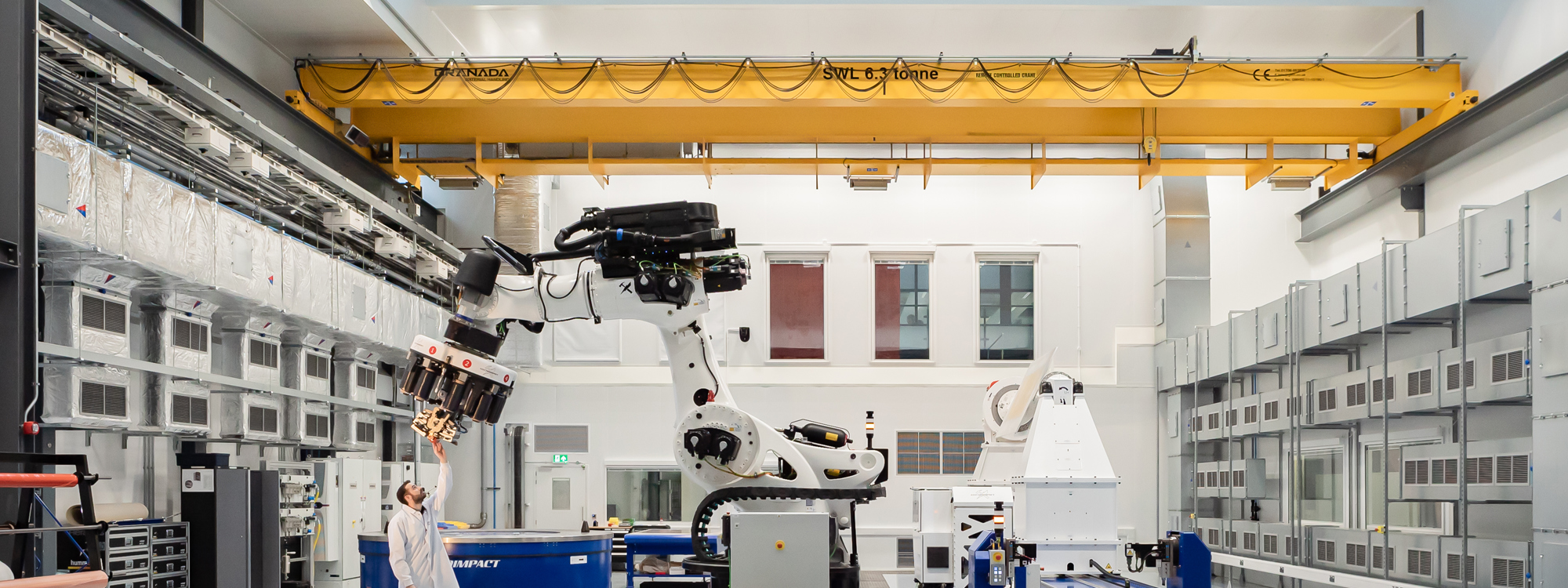
NCC begins tenth birthday celebrations by unveiling new state of the art Automated Fibre Placement-Automated Tape Lay Up capability (AFP-ATL)
The UK’s world-leading composites research and development facility, the National Composites Centre (Bristol, UK) has today unveiled the latest of its state-of-the-art capabilities in the form of a new AFP- ATL cell.
The cell, created in partnership with Electroimpact (Flintshire, UK) is a uniquely designed capability that combines both AFP and ATL in a single system. The dual system can be used individually or together to collaborate and create large, complex structures with minimal downtime. The robot is intended for medium to large scale manufacturing with high performance and accuracy robotic motion platform.
The new cell is the exciting final piece in an impressive £36.7m jigsaw of ten new fully digital automated composite manufacturing capabilities that have been installed in the past 18 months.
The Automated Fibre Placement (AFP) process head utilises x 8 tows, each measuring 12.7mm wide, with either an infrared heater to manufacture thermoset composites, or the novel humm3® flash technology which has been developed by Heraeus Noblelight Ltd. (Cambridge, UK) and tested at the NCC for to manufacture thermosets of low temperatures (30-60 degrees) and high temperature thermoplastics or bindered dry fibre (100-300 degrees).
The Automated Tape Layup (ATL) head can deposit tapes of 75, 200 or 300mm widths using the same heating systems and material processing capability as AFP.
Vertical and horizontal rotators allow for complex tools to be used to create geometries such as convex and concave panels, large scale diameter pipes, spars or barrel/tower structures. The rotators enable components of up to 4.6m diameter, and 7m in length to be manufactured. The cell's flat tables also allow for smaller scale analyses such as material testing or prototype trials to de-risk programs and build knowledge prior to larger scale projects.
Eva Collado Sastre from the NCC said, “The NCC's AFP-ATL capability is a perfect test bed for automated composite manufacturing at a medium to large scale level. The system will enable new and existing markets to build up their innovation platforms from the ground up, from small scale prototyping and material testing through to full scale demonstrators and data analytics. The output for customers will be the enabling of high-performance products, created at high volume with reduced cost and waste to achieve step change technology in their field.”
Alastair Gray from Electroimpact added, “The hybrid cell offers the NCC flexibility to manufacture a range of part geometries and using various material types and formats. Furthermore, thanks to the modular nature of the of the end effectors to the motion platform, it is possible for the NCC to future proof their cell to accommodate the very latest in composite head technology and innovation as it becomes available, thus ensuring NCC is able to offer cutting edge technology to customers and stake holders alike.”
Alex Hickson from ATI added “This new investment continues to enhance the UK’s position in leading aerospace composite research, development and manufacturing capabilities. This advanced combined AFP-ATL automation equipment offers a means to develop and broad selection of future products for aircraft structures and engine applications. It has been specified to meet the sector’s demanding technical and quality requirements at increasingly high rates to meet the productivity needs of industry that are commercially competitive.”
The National Composites Centre is one of seven centres that make up the UK’s High Value Manufacturing Catapult which is Europe’s largest RTO. Opened in 2011 the centre has seen over £200m investment in capabilities. It has worked with organisations globally to progress the adoption of composite products.
The innovations provided by AFP and ATL have transformed the aerospace industry allowing fuselage sections and wing spars to be manufactured at an industrial scale, not previously possible using traditional composite manufacturing methods. Currently though, these breakthroughs have been almost exclusively benefitted the traditional composites manufacturing industries mentioned. Through collaboration, the NCC believe that AFP-ATL has the ability to reduce the barrier to entry to these game changing technologies and expand the composite market into other areas such as renewable energy, oil & gas, construction and rail.
The ten automated composite manufacturing capabilities that have been installed in the past 18 months thanks to funding from the Aerospace Technology Institute (ATI, Cranfield, UK) West of England Combined Authority (WECA, Bristol, UK) Local Enterprise Partnerships also includes:
- An ultra-high-rate deposition cell that can lay up to 5m x 20m wide components with mm accuracy with 20m multi zoned oven and a state-of-the-art verification cell to accompany the scale
- Europe’s largest multi axial composite braider and
- An impressive composite overmoulder which is of particular interest to automotive and other high rate manufacturing sectors.

